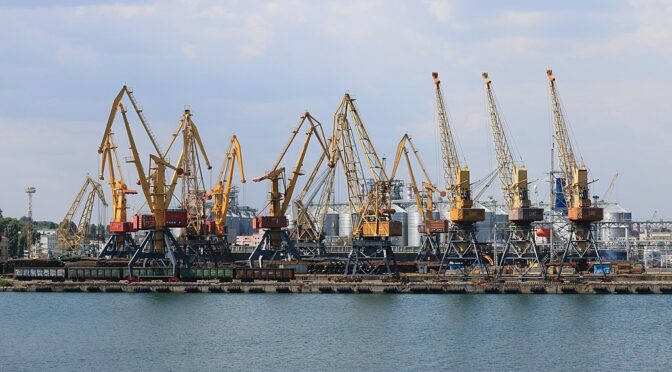Article published in The Daily Telegraph, 22 May 2022. © Richard Kemp
Putin’s blockade of grain and other foodstuffs leaving Ukraine by sea threatens a shortage that could cause starvation for millions around the world as well as major political upheaval. Russia attacked eight cargo vessels early in the conflict and another struck a mine, paralysing sea movement in the Black Sea. With no other feasible option to counter Moscow’s stranglehold, now is the time for a humanitarian coalition of navies to mount an operation to protect merchant shipping.
Ukraine is one of the world’s largest suppliers of corn, barley and wheat and, according to British transport minister Grant Shapps, the blockade could create a global famine that causes more deaths than the war itself. Twenty-five million tons of grain are waiting to be shipped and food prices are soaring — as high as 50 per cent in some developing countries.
As well as a humanitarian disaster we are facing an international security crisis. Many of the 400 million people that depend on Ukraine’s grain are in North Africa and the Middle East where serious political instability threatens if populations can no longer afford bread and other staples. Steep increases in the cost of food helped trigger the Arab Spring rebellions of the early 2010s. Last week General Christopher Cavoli, US Army commander in Europe and North Africa, warned the fallout from Russia’s blockade could strengthen terrorist groups, including the Islamic State, who thrive on food insecurity and poverty. Not to mention the new wave of migration towards Europe that this could produce.
We will soon reach a crunch point as this year’s harvest looms. Measures to increase shipments by rail and road including to seaports in Poland and Romania are in hand and making a difference. But overburdened port capacity and incompatible rail gauges, which lead to delays of up to a month, are among the multitude of logistic challenges that mean overland routes cannot come close to achieving the volumes required.
A few days ago Putin suggested he would permit grain shipments from Ukraine in exchange for lifting sanctions. That presents a moral dilemma for the West, since easing the pressure on Russia cannot be considered while its forces are killing Ukrainian soldiers and civilians by the thousands in a war that has no end in sight. In any case when we look at Putin’s record on humanitarian undertakings, what is his word worth?
Only naval action can now abate this crisis. Romania, Bulgaria and Turkey — Nato members with navies in the Black Sea — even if willing to take part do not have sufficient capabilities for this mission alone so warships from other countries would have to reinforce them. Ankara’s support is needed to allow access to the Bosphorus strait that controls entry from the Mediterranean. Under international law Turkey can deny passage through the strait for warships and has done so since the start of this conflict. Erdogan might baulk at aggravating Putin by allowing other Nato navies into the Black Sea but will even he be prepared to stand in the way of preventing a global catastrophe that also impacts Turkey?
Of course there should also be an attempt to secure Russia’s support too, since it also has a stake in some level of global stability. But in reality, Russia would likely veto an operation under UN Security Council auspices. So a taskforce must be assembled by Nato or an ad hoc naval coalition including the UK and US, potentially based out of the Romanian port of Constanta. A flotilla of minesweepers would clear safe lanes of sea mines that have been laid by both sides since the start of the war. Frigates and destroyers, on stand-by and based in Romanian waters, would protect merchant vessels transiting the Black Sea in both directions.
There is danger in such a large-scale operation, but it is achievable – and would ease suffering without engaging in conflict. The truth is that Moscow, which is now making considerable progress in the land war, has little to gain from attacking merchant ships. It will kick up a fuss about Nato warships being in close quarters, but the next step of striking food supplies and initiating a direct conflict would be too steep to take. Indeed, sending large quantities of lethal weapons for Ukraine to attack Russian troops is much more provocative than escorting merchant ships on humanitarian missions.
In a careful manner, we should now have this conversation. Let’s evaluate the risk, and compare it to the tragedy we face: famine and widespread violence in the developing world. If Putin achieves his objectives in Donbas his next move will likely be to take the whole of Ukraine’s coastline, which would make securing grain exports under current conditions look like a walk in the park.
Image: Wikimedia Commons

